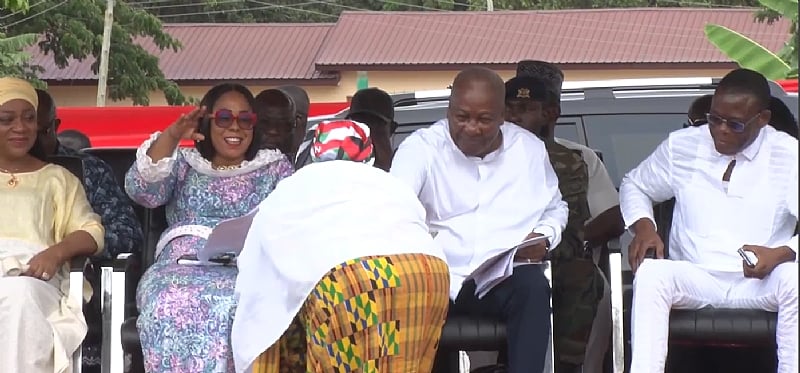Former President John Dramani Mahama’s recent act of generosity during his “Thank You Tour” has drawn attention and prompted a swift clarification, highlighting the sensitivity surrounding cash gifts in the Ghanaian political landscape. During a stop at the Old Ghanata Astroturf in Dodowa, Mahama presented a cash gift to a traditional dancer who had performed at the event. Recognizing the potential for misinterpretation and perhaps mindful of the recent controversy involving another political figure, Mahama immediately clarified that the sum he gifted was 500 Ghana cedis, not US dollars. This seemingly minor detail underscores the heightened awareness of public perception and the potential for even well-intentioned acts to be scrutinized within the political sphere.
The context for Mahama’s rapid clarification lies in a recent incident involving Sammy Gyamfi, the acting Chief Executive Officer of the Ghana Gold Board (GoldBod). Gyamfi faced public backlash after presenting a cash gift in US dollars to Evangelist Mama Pat, popularly known as Agradaa. This act drew criticism and accusations of impropriety, sparking a public debate on the appropriateness of such gifts, particularly from public figures. Gyamfi subsequently issued a public apology for the incident. Mahama, while acknowledging and accepting Gyamfi’s apology, also offered a piece of advice, urging him to exercise greater caution and discretion in his future actions, particularly regarding public displays of gifting.
Mahama’s proactive clarification regarding his own cash gift can be viewed as a preemptive measure to avoid a similar controversy. By explicitly stating the amount and currency of his gift, he sought to eliminate any ambiguity and prevent speculation that could lead to accusations of lavish spending or inappropriate use of funds, concerns that were raised in the Gyamfi incident. This careful approach underscores the growing sensitivity surrounding the display of wealth and the giving of cash gifts, especially within the political arena where such actions are often subject to intense public scrutiny.
The two incidents, while seemingly separate, highlight a shared underlying theme: the increasing public sensitivity to displays of wealth, especially by political figures. In a nation grappling with economic challenges, public displays of affluence can be perceived as insensitive and out of touch with the struggles of ordinary citizens. This sensitivity extends beyond the amount of money involved; the currency itself can become a symbol of disparity. The use of US dollars, as opposed to the local currency, can be interpreted as a display of privilege and a disconnect from the economic realities faced by the majority of the population. This perception can be further amplified when the recipient of the gift is a controversial or polarizing figure, as was the case with Agradaa.
The public’s reaction to both Gyamfi and Mahama’s actions reveals a growing expectation of transparency and accountability from public figures. There is an increasing demand for politicians and those in positions of power to be mindful of how their actions are perceived, especially when it comes to the handling of money. This scrutiny reflects a desire for leaders who are not only financially responsible but also demonstrably sensitive to the economic realities of the people they represent. The rapid dissemination of information through social media and traditional news outlets has amplified the impact of these incidents, creating a climate where even seemingly small gestures can become subjects of national debate.
In conclusion, the incidents involving Mahama and Gyamfi, while differing in specifics, underscore the heightened scrutiny surrounding displays of wealth and gifting by public figures in Ghana. Mahama’s swift clarification, prompted by the controversy surrounding Gyamfi’s gift, highlights the importance of proactive transparency in a climate of heightened public sensitivity. These incidents also serve as a reminder of the evolving expectations of public figures, particularly in the political sphere, where even seemingly minor actions can have significant repercussions. The public now demands greater accountability and sensitivity from their leaders, expecting them to not only adhere to ethical standards but also to be demonstrably mindful of the economic realities faced by the citizens they represent. The currency of trust, in the political landscape, is clearly linked to a perceived understanding and empathy for the economic challenges faced by ordinary citizens.


